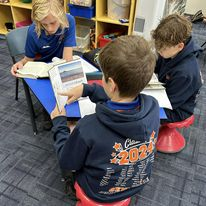Teaching Metacognitively with Young Writers
The ability of young writers to reflect upon their written works and to reflect upon the thinking that influenced their writing processes is of significant importance.
It is essential to develop a sense of ones-self when writing. It is a critical component when striving for improved levels of writing attainment. Young writers begin to thrive when metacognitive awareness and reflection is fostered by their teachers.
The role teachers play in this growth of metacognition is evidenced when writers in a classroom community exhibit a shared metalanguage while discussing aspects of their individual writing process.
When prompted in this way young writers willingly convey their writing intentions, or engage purposefully in writing conversations (writing conferences) with fellow writers -peers and teachers alike.
In other words, they discuss the events surrounding their writing lives, and they do it using the specific vocabulary of writing. This is the result of teacher's concerted efforts to mindfully model and promote the specific language of writing- each and every day.
It is so affirming when, as a teacher, you begin to notice young writers speaking about writing in this self aware manner. The language surrounding writing begins to shine in the words they articulate.
How Do Teachers Foster Such Writing Behaviours?
- When discussing a young writer's individual process, teachers pose questions that tease out the writer's considered actions. Open ended questions regarding- how, what, where, why, feature strongly. The teacher encourages the writer to revisit the process undertaken, inviting them to tell more about those moments.
- Teachers also engage in the use of 'think aloud' strategies to model their own thinking around writing. They ponder possibility, they imagine, think, share writing related knowledge and discuss specific writing beliefs. They become the light on the hill.
- Teachers share their own writing, but even more importantly they share their own writing processes, trevealling how the writing came to life on the page. They work to make their writing lives visible to less experienved writers.
- Teachers also share their writing goals and how they select writing projects for themselves. They highlight pre-writing strategies used in preparation for a writing project, readily sharing resources, research and checklists that may inform their writing.
Such mindful actions, consistently applied, lead the inexperienced writer towards achieving, not just their personal writing goals. but it raises the likelihood of self efficacy and self regulation becoming more and more evident in the young writer's conduct -both in the classroom and beyond.
Alan j Wright
Education Consultant, Writer, Poet.








Comments
Post a Comment